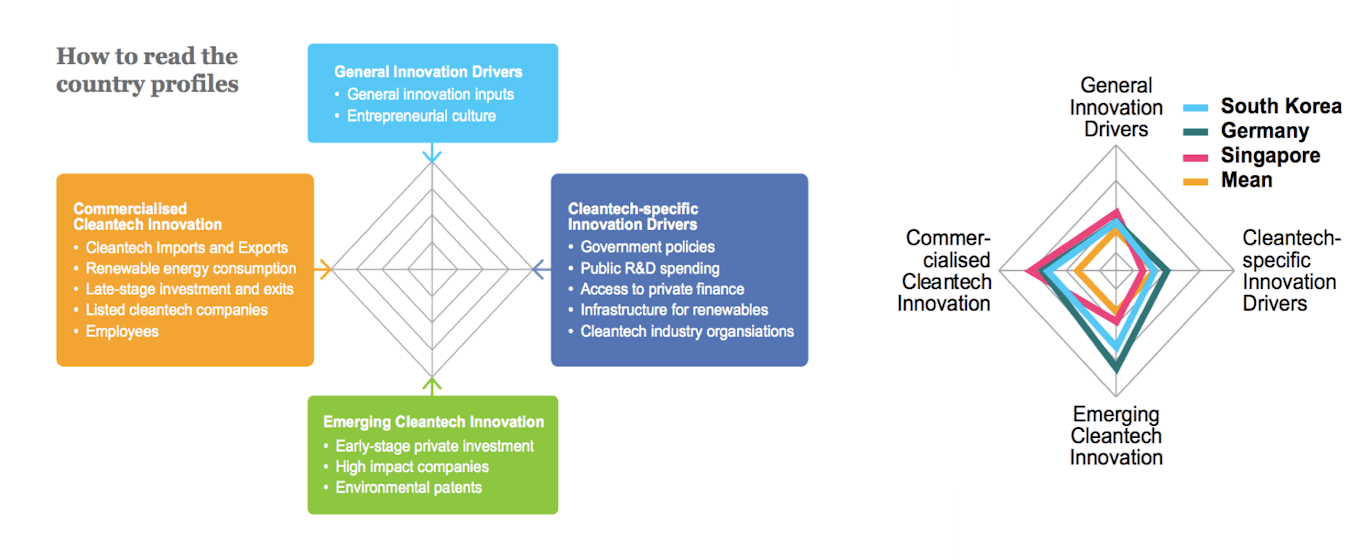Six hundred-and-forty billion US dollars – that is the size of the prize in Asia’s cleantech sector, a long underserved but increasingly critical part of the economy as sustainability comes into focus throughout the world.
To continue reading, subscribe to Eco‑Business.
There's something for everyone. We offer a range of subscription plans.
- Access our stories and receive our Insights Weekly newsletter with the free EB Member plan.
- Unlock unlimited access to our content and archive with EB Circle.
- Publish your content with EB Premium.
According to an Asian Development Bank (ADB) report, Asia will need to secure more funding in order to bring about the solutions needed to fight or adapt to climate change.
“With sustainability goals moving up the agenda of governments in recent years, there is no question that cleantech has huge potential in the region,” says Steve Leonard, the founding chief executive officer of SGInnovate, a Singapore government-backed private company that oversees the development of science, research-based solutions and deep tech, which refers to scientific advances to tackle world’s growing problems.
“Increasingly, we see new players emerging in the cleantech ecosystem to capitalise on this opportunity,” Leonard adds.
Rapid urbanisation and climate change are urging governments and citizens to relook traditional pathways of development. A report published by UN-Habitat in 2017 on sustainable urbanisation found that 113 out of the 164 countries that had signed the Paris Agreement have included urban management strategies in their nationally determined contributions, which are plans to reduce greenhouse gas emissions and adapt to climate change.
Indonesia, for instance, requires investments up to US$25 billion in order to reform its water infrastructure, while the expanding Indian renewable energy market is estimated to require US$50 billion in investments by 2022.
Changing models of development are critical because while cities may only occupy 2 per cent of land on earth, they contribute a disproportionate 70 per cent of all greenhouse gas emissions produced. This is set to worsen by 2050 when another 2.5 billion more people will live in urban areas.
Meanwhile, cleantech in the energy sector has helped to slow the growth in global energy-related carbon dioxide (CO2) emissions from 2.2 per cent in the previous decade to 0.2 per cent in 2016, according to the Renewables Global Status Report.
Where disaster spells opportunity
In response to this changing landscape, there is a growing market demand for solutions to tackle urban liveability issues, says Rebekah Lin who is the marketing and strategy director at FundedHere, a Singapore-based crowdfunding platform for projects that hope to get funded.
She adds: “People are getting increasingly conscious and aware of their investment choices. We see a lot of interest in solutions that are related to cleantech or eco-tech.”
Emerging cleantech solutions in the market for efficient and sustainable urban resource management are increasingly focused on disruptive technologies like the Internet of Things (IoT) and Artificial Intelligence (AI), says Genping Liu, a partner at Vertex Ventures Southeast Asia & India, which invests in high-growth start-ups in the region.
“
The involvement of the private sector would help social start-ups develop their business model and expand their networks in business development, which are resources cleantech start-ups need.
Bolun Li, Co-founder, Development Innovation Insider
“Given that Asia’s infrastructure is generally behind Western countries,” elaborates Liu, “there is an opportunity for key trends to leapfrog existing ones in adoption, like how the mobile phones became more popular than personal computers [in developing countries]. ”
Such technological disruptions will not only benefit urban areas but will also serve the middle and low-income populations outside cities which are extremely difficult to provide for at scale, comments Bolun Li, co-founder of Development Innovation Inside (di insider) a platform that connects grassroots social enterprises in Asia with investors.
For instance, cleantech solutions such as smart meters can help rural households monitor their energy usage, prevent energy wastage and connect to different households, Li tells Eco-Business.
“Deep tech will always be part of the conversation when we talk about the future of cleantech,” says Leonard, describing the ability of engineering and research-based technological solutions to improve living conditions for people in cities.
This potential remains underutilised, especially in developing states in Asia where there is a significant lack of cleantech communities and support systems demonstrated by the low number of cleantech-focused incubators and accelerators.

Singapore’s performance as a commercialiser roots from the nation’s strength to import and export cleantech commodities, unique in Asia. This is different from Germany and South Korea, where the commercialisation is driven by the domestic clean energy market. Source: The Global Cleantech Innovation Index 2017.
SGInnovate’s Leonard tells Eco-Business that deep tech solutions like artificial intelligence, robotics and blockchain are currently funded primarily by the public sector and need more investment from the venture capitalist community.
He says: “We hope to see more enthusiasm from corporates and more people saying that they want to give it a shot instead of people willing to invest when there is less risk.”
Less than 10 per cent of global cleantech venture capital investment goes to cleantech entrepreneurs and start-ups in Asia. This remains a major challenge for entrepreneurial ventures developing cleantech solutions in developing Asian nations according to the ADB report on cleantech in Asia.
Bridging the gap
One problem is that start-ups seldom consider their financial sustainability since conception, and start doing so only running out of money, according to Li.
Lin says that FundedHere comes across groups that are passionate about their projects but have difficulty keeping their businesses financially sustainable.
She encourages start-ups to look realistically at their financials in order to develop cleantech solutions.
Events like The Liveability Challenge, an initiative launched by Temasek Foundation Ecosperity this year, can help start-ups on this front, says Li. “The involvement of the private sector would help social start-ups develop their business model and expand their networks in business development, which are resources cleantech start-ups need.”
Held for the first time this year, the event called for urban solutions to waste management and sustainable cooling. The six finalists selected will pitch their ideas to investors at a finale event on 11 July for the chance to win up ton S$1 million in funding for their projects. The event also aims to showcase cleantech solutions for Asia and interest regional investors in funding sustainable projects.
Lim Hock Chuan, chief executive of Temasek Foundation Ecosperity, says the organisation has so far supported 18 projects that provide innovative solutions to address problem areas in liveability and sustainability, such as in waste management and sustainable cooling.
“Through The Liveability Challenge, we hope to surface impactful ideas, and help to eventually bring them to the marketplace and make Singapore a more sustainable and liveable city.”
Additionally, The Liveability Challenge is a push in the back for innovators to create and scale solutions to some of the most pressing issues in the world, comments SGInnovate’s Leonard.
To bridge the gap between entrepreneurs and venture capitalists, trust needs to be built by sharing information about the growing urgency for sustainable development in Asia’s urban centres, says Lin.
She adds: “This would hopefully motivate many aspiring entrepreneurs in our region to have a social mission and environmental focus in their work.”










